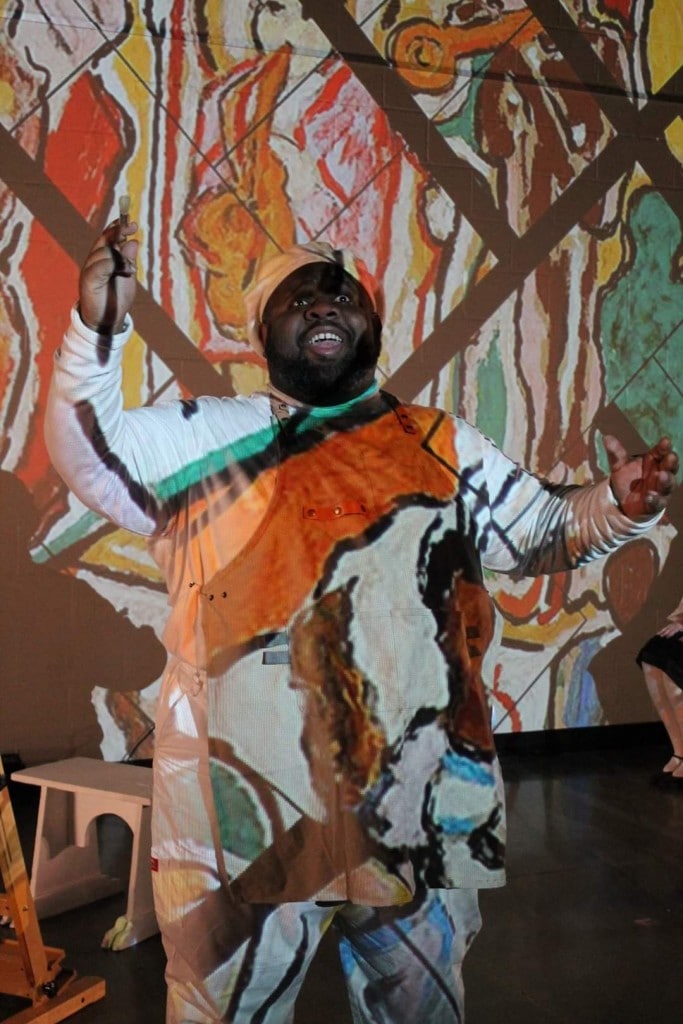
The process of becoming celebrated Knoxville artist Beauford Delaney
Beauford Delaney was an African-American artist who was born (1901) and raised in Knoxville, Tennessee. His father was both a barber and a minister, and his mother worked cleaning houses. They were well-respected members of the community, and Beauford and his siblings lived a life that was relatively comfortable by the standards of the day for black families. One of those siblings, Joseph, would also go on to become a famous artist in his own right.
Beauford, though, would go on to become a seminal figure in the Harlem Renaissance movement and was close friends with many of the writers, performers and other visual artists that defined that period. He was respected not only for his artistic talents, but also for what is described as an outsized and gregarious personality, his deep and booming singing voice (and an accompanying love for music, particularly jazz, hymns and opera) and for a quiet wisdom borne of periods of deep introspection and his keen social intelligence.
Notably, he would form an incredibly intimate mentor/mentee relationship with the author James Baldwin. Though Delaney was discretely homosexual and clearly attracted to the younger Baldwin, there is no evidence that their relationship was ever a physical one. Their deep friendship would last a lifetime, and it ultimately influenced Delaney to follow Baldwin to Paris. It was an escape that several black artists of the day would make, but they sought the social freedoms afforded them by a more progressive country. He would spend the final 30 years of his life there.
Unbeknownst to all but his closest friends, Delaney spent most of his life suffering from what we now believe was severe schizophrenia. The voices he heard demeaned him constantly about everything from his art to his sexuality – and even demanded that he kill himself on multiple occasions. According to his own writings, the only respite he ever received from this onslaught came when he was creating his art. For this reason, he painted prolifically, and his works now reside in galleries and museums all over the world. Despite the notoriety that the artist has achieved in recent years, during his lifetime, he was well-respected but poor. He died broke and in an insane asylum in Paris, and he was buried in a pauper’s grave.
Knoxville has gone to great lengths this year to celebrate Delaney’s legacy and the impact of his many works on the modernist, expressionist and abstract movements. His near-obsession with the effects of light on perception and composition were ahead of their time, and both reflected and expounded upon the ideas of Monet, van Gogh and Matisse. As part of the city’s greater overall celebration efforts, the opera company that I help manage, Marble City Opera, was tasked with producing a work about the artist’s life.
Working with a local librettist and a composer with whom the company had worked in the past, a one-hour chamber opera entitled “ShadowLight” was produced over the course of three years. The piece had its world premiere at the Beck Cultural Exchange Center during the last weekend of February and opened to rave reviews and sold-out crowds. I was tasked with portraying the artist at the center of the piece, Beauford Delaney, and in doing so, I learned a lot more about myself than I expected.
On the surface, there are a few big similarities between myself and the artist. He was a short, round black man with a big personality who liked to sing and had a deep voice. If you’ve ever met me even once … that’s likely how you would describe me, right down to the letter. As for the rest, though, we couldn’t be more different – or so I thought.
I assumed that I’d have an easy time pretending to be this guy onstage. Sing some songs, move a paintbrush around a little bit, act a little “crazy” and go about my evening as usual after the performance was over. The deeper I got into the project, however, what I found was much more nuanced and much more personal. Thus began a three-year process of learning and discovery that only deepened once the opera was completed and I finally got the chance to look at the music.
You naturally mature a great deal between the ages of 30 and 33, but some events have a way of aging you well beyond your years. About a year and a half into getting to know Beauford, my mother passed away unexpectedly at the age of 50. It was not the result of some long battle with an illness or anything else that would have given warning or time to prepare for the loss. It just … happened. In an instant, it was as though whatever remnants of the innocence of childhood that had remained within me evaporated.
As a millennial, I had always looked to various ephemeral markers of progress by which to gauge my life and determine whether or not I was really an “adult.” For some, that means marriage or kids. For others, it’s purchasing a home or finally becoming whatever profession they always dreamed of. For me, it will forever be the moment that I got the call.
It came early on a Saturday morning, and I answered, fuzzily, because of the hour but still happy because I knew that she was the only person who would ever call me that early. I used a nickname that I’ll never call anyone again and spoke for the last time in a tone reserved for the only person who could legitimately tell me to “take all of that bass out of your voice.” But it wasn’t her on the other end of the phone that morning, and from that moment on, regardless of whatever else I had been before then, I was definitely an “adult.”
This experience in my own life would become one of the pillars upon which I built my portrayal of the artist. Delaney’s mother had been the central figure in his early life, and her proud voice was the only one, amongst the many others, that he didn’t wish to quiet, that he longed to hear more of as his mental health deteriorated. His mother appears in the opera directly – or instead, her “voice” does, only briefly, but she is referenced throughout. Cleverly, or perhaps better said as cruelly, each reference to her is used by the schizophrenic Greek chorus of voices to set him up for increasingly nasty blows to his psyche. Like a boxer using their jab to break an opponent’s guard, the memory of his mother was used to get under Delaney’s skin just enough and create an opening for further tortures like his sexuality and his insecurity over his work.
As a performer who is just as much action as singer, I had to recognize how this device was being used jointly by the composer and librettist and to then allow myself to take that journey with the character: to fully let myself settle into the feeling of someone who misses his mother desperately, thinks that she’s coming to visit or that I’m going to see her … and then let myself fully experience having a voice taunt me by saying, “Ha! Fooled you again! Your mama’s dead!”
Other demons plagued Delaney, and whether or not I truly comprehended what each of those individual struggles were, I let my mind wander to those places and settle there. Some of them were not nearly as much of a stretch as I had anticipated they’d be; through repetition, though, the beats began to feel like home. I was a man committed to building and living in a house of cards, knowing full well that someone was coming to knock them over again. It was a journey … an exhausting one. In taking it, however, I began to understand the quiet strength of Delaney.
Power is not walling yourself off from your feelings and pretending like things don’t affect you. It’s experiencing those feelings and letting them lift you up – even if they ultimately let you down again. In allowing myself to take that journey with this stranger of an artist, I would learn more about myself than I had ever imagined possible. Life is lived in the shadows AND the light, and how we handle both defines who we are. If any of us is able to create from our moments of darkness a fraction of the beauty that Beauford displayed throughout his lifetime, we should consider ourselves fortunate. I know I do.







